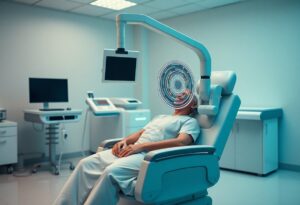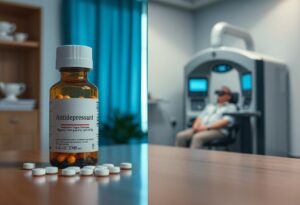Many individuals grappling with bipolar disorder seek alternative treatment options to manage their symptoms. Transcranial Magnetic Stimulation (TMS) therapy has gained attention as a potential non-invasive intervention. In this blog post, you will discover the scientific insights surrounding TMS therapy and its effectiveness for bipolar disorder. We will explore how this innovative technique may offer hope and relief to those affected by this complex mental health condition.
Key Takeaways:
- TMS Therapy Effectiveness: Studies indicate TMS therapy can be effective in reducing symptoms of bipolar disorder, particularly during depressive episodes.
- Mechanism of Action: TMS works by stimulating specific brain areas, potentially helping to re-regulate mood and alleviate depressive symptoms.
- Limited Research: While promising, research on the effects of TMS in bipolar disorder is still limited, and more studies are needed to establish its long-term efficacy and safety.
Understanding Bipolar Disorder
While navigating the complexities of mental health, it is important to understand bipolar disorder, a condition characterized by extreme mood swings that can affect your daily life.
Definition and Types
Before delving deeper, bipolar disorder is defined by oscillating episodes of mania, hypomania, and depression. There are several types of bipolar disorder, including:
- Bipolar I Disorder
- Bipolar II Disorder
- Cyclothymic Disorder
- Other Specified and Unspecified Bipolar and Related Disorders
- Thou may experience varying symptoms based on the type.
| Type | Characteristics |
|---|---|
| Bipolar I Disorder | Characterized by one or more manic episodes. |
| Bipolar II Disorder | Involves at least one major depressive episode and one hypomanic episode. |
| Cyclothymic Disorder | Involves periods of hypomania and mild depression lasting for at least two years. |
| Other Specified | Symptoms that do not match the other categories. |
| Unspecified | Situations where you choose not to specify reasons for the symptoms. |
Symptoms and Diagnosis
After recognizing the types, it is important to understand the symptoms and how a diagnosis is typically made. Symptoms often include drastic mood changes, erratic behavior, and shifts in energy levels.
This condition may manifest through distinct episodes, with manic/hypomanic symptoms such as elevated moods, excessive energy, and racing thoughts, contrasted by depressive symptoms like fatigue, hopelessness, and lack of interest. Diagnosis is generally made through clinical interviews and screening tools, ensuring that your healthcare provider considers your history and symptom patterns.
Causes and Risk Factors
Behind bipolar disorder are several potential causes and risk factors that contribute to its development, including genetics, brain structure, and environmental triggers.
After understanding the basic causes, it’s vital to know the following factors that may increase your risk of developing bipolar disorder:
- Family history of bipolar disorder
- Major life changes or stress
- Substance abuse
- Physical health issues
- After understanding these factors, seek professional help if needed.
It is important to approach bipolar disorder with compassion and clarity, recognizing that each individual may experience a different set of challenges and treatments. By understanding these risk factors, you can better equip yourself to manage your mental health or support loved ones.

Overview of TMS Therapy
Even as mental health treatments continue to evolve, Transcranial Magnetic Stimulation (TMS) has emerged as a promising tool in managing various mood disorders, including bipolar disorder. This non-invasive therapy uses magnetic fields to stimulate nerve cells in the brain, aiming to improve symptoms and enhance overall well-being.
What is TMS Therapy?
After being FDA-cleared, TMS therapy has gained recognition for its effectiveness in treating conditions like depression and anxiety. It involves placing a magnetic coil on your scalp, which delivers targeted magnetic pulses to specific brain regions, promoting neuroplasticity and improving mood regulation.
Mechanism of Action
Therapy works by modulating brain activity through electromagnetic pulses. These pulses can increase the excitability of neurons in the targeted areas, helping to restore balance in neurotransmitter levels, which is often disrupted in bipolar disorder. This targeted stimulation may lead to improved mood and cognitive function.
What distinguishes TMS from traditional treatments is its non-invasive nature and precise targeting. This advanced approach reduces the likelihood of systemic side effects associated with medications by focusing only on affected brain regions. As a result, many patients experience symptom relief without the burden of significant adverse effects.
Comparison with Other Therapies
Mechanism Comparison of TMS and Other Therapies
Therapy Type | Key Differences
— | —
TMS | Non-invasive, targeted magnetic stimulation, minimal side effects.
Medications | Systemic effects, possible side effects, variable efficacy.
Psychotherapy | Addresses behavioral aspects, may require longer-term commitment.
Electroconvulsive Therapy (ECT) | Invasive, used for severe cases, involves anesthesia.
It’s important to understand how TMS stacks up against other therapeutic options. While medications and psychotherapy can be beneficial, they often come with risks of side effects or longer treatment durations. TMS offers a unique alternative that may appeal to those looking for a targeted and less invasive solution.
Scientific Research on TMS and Bipolar Disorder
To understand the potential of Transcranial Magnetic Stimulation (TMS) in treating bipolar disorder, it is necessary to explore the existing scientific research and findings. Several studies have aimed to determine the effectiveness of TMS on individuals struggling with this complex mental health condition.
Recent Studies and Findings
Below are some significant recent studies that examine the relationship between TMS therapy and bipolar disorder. Researchers have focused on its impact on mood stabilization and the reduction of depressive episodes, highlighting promising outcomes for patients.
Effectiveness of TMS in Bipolar Depression
Research has shown that TMS may effectively alleviate symptoms of bipolar depression. Early studies report a noticeable improvement in mood and a reduction in depressive episodes among those receiving TMS treatment. This innovative approach may provide an alternative for individuals who have not responded well to traditional therapies.
Recent research indicates that TMS can lead to significant improvements in mood stabilization and overall functioning for individuals with bipolar disorder. In clinical trials, patients have reported reduced depressive symptoms and enhanced emotional regulation following TMS sessions. Furthermore, it appears that TMS has a lower risk of triggering manic episodes compared to certain pharmacological treatments, making it a safer option for many individuals.
Comparison with Traditional Treatments
Effectiveness of TMS compared to traditional treatments can be observed in the following table:
Comparison of Treatment Options
| Treatment | Effectiveness |
|---|---|
| TMS Therapy | Promising results in reducing depressive symptoms with lower risk of mania. |
| Medication | Effective for many but can have side effects and risks of triggering mania. |
| Psychotherapy | Helpful but often needs to be combined with medication for severe cases. |
Understanding the comparative effectiveness between TMS and traditional treatments enables you to make informed decisions about your mental health. While each option has its benefits and limitations, TMS stands out due to its non-invasive nature and lower risk profile. Those considering TMS as a treatment option should consult with their healthcare provider to discuss individual circumstances and treatment goals.
Benefits of TMS Therapy for Bipolar Disorder
Unlike traditional therapies, Transcranial Magnetic Stimulation (TMS) for Bipolar Disorder offers a unique approach that may benefit those struggling with this mental health condition. Research indicates that TMS can effectively reduce depressive episodes and improve overall mood stability. For more detailed insights, you can explore Transcranial Magnetic Stimulation (TMS) for Bipolar Disorder.
Non-Invasive Treatment Approach
Around TMS is a non-invasive procedure, meaning it does not require any surgical intervention or hospitalization. This aspect makes it an appealing option for individuals seeking an effective treatment without the complications associated with more invasive methods.
Minimal Side Effects
Disorder with most treatments, side effects can be a concern. However, TMS is known for having minimal side effects, which can include mild headaches or scalp discomfort. These typically resolve shortly after treatment sessions, making TMS a desirable option for many.
Consequently, because the side effects are generally mild and manageable, you can continue your daily life without significant disruption. This leads many individuals to prefer TMS over other treatment options that might result in more severe or longer-lasting side effects, such as weight gain or fatigue.
Quick and Convenient Sessions
Across TMS sessions, treatments are typically brief, lasting about 20 to 40 minutes each. This means you can easily fit them into your busy schedule without needing a lengthy commitment.
Even better, the convenience of TMS allows for multiple sessions per week, enabling you to experience benefits in a shorter timeframe than many traditional therapies. This flexibility can be especially important when managing bipolar disorder, as timely interventions can help stabilize your mood and improve your quality of life.
Limitations and Considerations
Now, it’s necessary to understand the limitations and considerations surrounding TMS therapy as it relates to bipolar disorder. This therapy might not be suitable for everyone, and it is necessary to weigh these factors carefully before making a decision.
Who is a Good Candidate?
Among individuals with bipolar disorder, those experiencing persistent depressive episodes may find TMS therapy beneficial. However, it is vital to consult with your healthcare provider to determine if you are a suitable candidate based on your specific condition and treatment history.
Potential Risks and Side Effects
Candidate for TMS therapy should be aware of potential risks and side effects. While TMS is generally considered safe, some individuals report headaches, scalp discomfort, or temporary mood changes following sessions.
This can include experiencing discomfort at the stimulation site or, in rare cases, the onset of manic episodes. Continuous monitoring and communication with your healthcare professional can help manage these risks effectively.
Cost and Accessibility Issues
Behind the benefits of TMS therapy are the financial considerations and accessibility concerns. This type of therapy can be expensive, and not all insurance plans cover it, which may present challenges for you as you seek treatment.
Considerations about cost and accessibility are significant when evaluating TMS therapy. Researching potential financial assistance programs, verifying your insurance coverage, and discussing payment plans with your provider can help make this treatment more attainable for you.

Future Directions in Research
After reviewing current findings on TMS therapy and its impacts on bipolar disorder, it becomes clear that further exploration is necessary to fully understand its potential. Ongoing research initiatives aim to investigate deeper into the effectiveness and long-term benefits of TMS for individuals battling this condition.
Ongoing Clinical Trials
Beside the significant findings, numerous clinical trials are currently underway to evaluate the efficacy of TMS therapy in treating bipolar disorder. These studies are pivotal as they aim to gather comprehensive data on patient outcomes, offering insights that could refine treatment approaches and guidelines.
Innovations in TMS Technology
On the horizon of TMS therapy advancements are exciting innovations that could enhance effectiveness and patient experience. Emerging technologies, including more targeted delivery systems and adaptive protocols, hold promise for optimizing treatment tailored to individuals’ needs.
But you should be aware that these innovations include the integration of neuroimaging techniques which can help identify specific brain areas that respond best to TMS. Furthermore, AI-assisted TMS treatment may lead to more personalized therapy plans, making treatment not only more effective but also more comfortable for you. These advancements are expected to push the boundaries of what is currently achievable with TMS therapy.
Combining TMS with Other Treatment Modalities
About enhancing the effectiveness of TMS therapy, researchers are exploring the synergy between TMS and other treatment modalities, such as pharmacotherapy and psychotherapy. This combination could potentially lead to more robust treatment regimens for managing bipolar symptoms.
To achieve the best outcomes, it is imperative to consider holistic treatment strategies that incorporate TMS with medications or therapy sessions. This multi-faceted approach allows for addressing various aspects of bipolar disorder, thereby improving your overall well-being. As studies evolve, understanding how these combinations may work together will provide clarity on optimizing your treatment plan.
Summing up
From above, you can see that while TMS therapy shows promise in treating bipolar disorder, especially in managing depressive episodes, further research is needed to fully understand its efficacy and safety for your condition. As you consider this treatment option, consulting with healthcare professionals will ensure you make informed decisions tailored to your specific needs. Staying up-to-date with scientific findings will empower you in your mental health journey.
FAQ
Q: What is TMS therapy and how does it work?
A: Transcranial Magnetic Stimulation (TMS) therapy is a non-invasive procedure that uses magnetic fields to stimulate nerve cells in the brain. It primarily targets areas associated with mood regulation. The therapy is thought to enhance brain activity in regions that may be underactive in individuals with mood disorders, potentially alleviating symptoms of depression and bipolar disorder.
Q: Can TMS therapy be used as a treatment for bipolar disorder?
A: Yes, TMS therapy can be utilized as a treatment option for individuals with bipolar disorder, particularly for those experiencing depressive episodes. Research suggests that TMS may help improve mood and reduce symptoms in patients with bipolar disorder, especially when traditional therapies have not been effective. However, it is vital for patients to discuss this treatment with their healthcare provider to determine the best approach for their specific situation.
Q: What does the scientific research say about TMS and bipolar disorder?
A: Several studies have explored the efficacy of TMS in patients with bipolar disorder. Research indicates that TMS can lead to significant reductions in depressive symptoms in bipolar patients. Some studies have demonstrated that TMS not only helps with depressive episodes but also has the potential to stabilize mood and reduce the frequency of mood swings. However, more extensive studies are needed to fully understand its long-term effects and optimal treatment protocols.
Q: Are there any risks or side effects associated with TMS therapy for bipolar disorder?
A: TMS therapy is generally considered safe, with few side effects. Commonly reported side effects include mild discomfort at the treatment site, headaches, and fatigue. In rare cases, more severe side effects such as seizures may occur, especially in individuals with a history of seizure disorders. It is important for patients to discuss any pre-existing medical conditions and medications with their healthcare provider to minimize risks.
Q: How does TMS therapy compare to traditional treatments for bipolar disorder?
A: TMS therapy offers an alternative to traditional treatments such as medication and psychotherapy. While medications like mood stabilizers and antidepressants are commonly prescribed, they may not work for everyone and can come with unwanted side effects. TMS may provide a valuable option for patients who have not responded well to conventional treatments or who prefer a non-medication approach. Ultimately, the best treatment plan should be personalized and developed in consultation with a healthcare professional.







